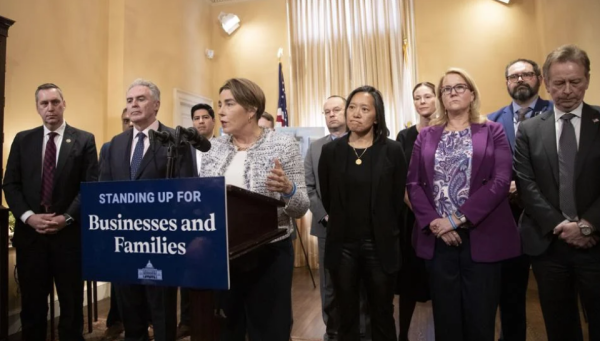April 10, 2025

Gov. Maura Healey, flanked by Cabinet secretaries and business leaders, speaks with reporters following a closed-door roundtable discussion about tariffs on April 9, 2025. Chris Lisinski/SHNS photo
Gov. Maura Healey was partway through a closed-door meeting with Cabinet secretaries and business leaders about the impact of sweeping tariffs when President Donald Trump suddenly reversed course and paused most of his plan.
But Healey and the other attendees expressed little relief about the about-face, and the governor warned that consumers and employers still face economic "chaos and uncertainty."
The pause "doesn't matter," Healey said, "because we are still left in a state of chaos and uncertainty."
"This is why people cannot deploy capital. They can't invest in their workforce," Healey told reporters, flanked by attendees of the State House meeting she convened.
Healey met with a range of high-profile Massachusetts industry group leaders one week after Trump announced massive tariffs on many of the nation's trading partners, a move that prompted major upheaval in the stock markets and warnings about recessionary impacts.
Just after 1:15 p.m. Wednesday, Trump posted to Truth Social announcing a 90-day pause on the higher tariffs he rolled out, replacing them in that span with a universal 10 percent tariff rate. However, the move did not apply to China. Trump instead increased the tariff rate there to 125%.
"Well, I thought that people were jumping a little bit out of line. They were getting yippy," Trump replied when asked about the pause, according to The New York Times. "They were getting a little bit afraid."
Healey said she learned about the president's change in plans during her roundtable meeting because she "got a message on [her] phone."
She argued that under the tariffs that remain in place, especially on China, "everyone still is going to continue to experience higher prices, higher costs."
"The fact remains: we do not know what is going to happen next. This is causing considerable harm to our residents, to our economy and to our businesses," she said. "At the end of the day, I wish somebody could reach the president and get him to stop, because enough is enough. We cannot continue to have our economy in Massachusetts and around this country held hostage. We cannot continue to gamble with people's livelihoods. There really is no excuse for this chaos."
Economic Development Secretary Yvonne Hao hinted the administration will roll out "some specific programs to address the current tariff issues" through quasi-public agencies like the Massachusetts Technology Collaborative.
Healey also pointed to quasi-public agencies as "tools at our disposal." She declined to provide details about what her team has in mind.
"We're going to have more to say on that very, very shortly," she replied when asked if the administration would create new programs or instead try to connect more businesses with existing programs.
In addition to Hao, the governor was joined at the press conference by Administration and Finance Secretary Matthew Gorzkowicz, Greater Boston Chamber of Commerce CEO James Rooney, Associated Industries of Massachusetts President Brooke Thomson, Retailers Association of Massachusetts President Jon Hurst, Mass. Business Roundtable President JD Chesloff, Black Economic Council of Mass. President Nicole Obi, and ALX President Eneida Roman.
Several of the industry leaders offered their own warnings about the economic impact from Trump's approach to tariffs. Rooney said "the uncertainty is paralyzing" for businesses.
Thomson recounted an industrial contractor in western Massachusetts who started the year believing 2025 would be "their best year on record."
"We thought we had left some of the uncertainty behind us in 2024. Now that that individual hit the third month, [they] started to really see some retraction from some of the folks that they were doing business with," Thomson said. "Now, by the first week in April, 50% of their contracts are on hold. 50%. That is completely devastating to a business that is small- and medium-sized."
"Let's be honest — even some of our larger employers, the conversation now that they are having is, can they stay open? Can they keep their workers?" she added.
Trump's approach to tariffs and pledges to pursue major federal spending cuts have raised major concerns among state budget-writers, who rely on billions of dollars in federal funding.
Healey filed a $62 billion fiscal year 2026 state budget proposal on Jan. 22, two days after Trump took office and before he put in motion many of his most dramatic policy changes. House Democrats next week will roll out their redraft of Healey's plan, which covers the fiscal year that begins July 1.
"We've got a responsibility to make sure that anything that I sign is within revenue and what we can sustain," Healey replied Wednesday when asked if she would be open to signing a final budget with a smaller bottom line than she proposed.


